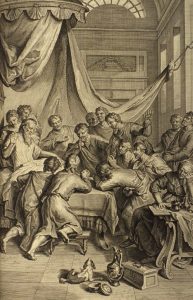It seems like a strange question because we all know Jacob had twelve sons: Reuben, Simeon, Levi, Judah, Issachar, Zebulun, Dan, Naphtali, Gad, Asher, Joseph and Benjamin.
We are also familiar with the well-known term – the Twelve Tribes of Israel.
So if this is the case, where are Ephraim and Manasseh? And when exactly did they become part of the “Twelve Tribes of Israel?”
In today’s “Parashah” {פרשה} (weekly Torah portion), “Vaychi” {ויחי} – Hebrew for “and he lived”, which is the twelfth weekly Torah portion in the annual Jewish cycle of Torah reading and the last one in the Book of Genesis (it is found in Genesis 47:28–50:26) it is told about Jacob’s blessings to all of his children.
Before Jacob blessed his own sons, he called Joseph and asked him to bring his two sons: Ephraim and Manasseh. Here is what Jacob said to Joseph:
“God Almighty appeared to me at Luz in the land of Canaan and blessed me, and said to me, ‘Behold, I will make you fruitful and multiply you, and I will make of you a company of peoples and will give this land to your offspring after you for an everlasting possession.’ And now your two sons, who were born to you in the land of Egypt before I came to you in Egypt, are mine; Ephraim and Manasseh shall be mine, as Reuben and Simeon are,” (Genesis 48:3-6).

Now, after Ephraim and Manasseh have joined ‘officially’ to the list of Jacob’s sons, another question emerges – if there are more than twelve tribes, why are they called “The Twelve Tribes of Israel?”
The answer is found in the inheritance of the Land of Israel. The land was divided into twelve portions and one portion was given to the tribes of: Reuben, Simeon, Judah, Issachar, Zebulun, Dan, Naphtali, Gad, Asher and Benjamin.
Now, as we have just seen, Joseph didn’t have a tribe and his land was divided between his two sons: Ephraim and Manasseh.
One tribe is missing and this is the tribe of Levi – the tribe of the priesthood, which had no land and was scattered among the other tribes. That is how we got the “Twelve Tribes of Israel”!
